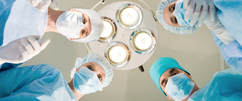weekly column
|
Each week, find a commentary on something connected to verses of Torah or another source of wisdom
|
|
Each week, find a commentary on something connected to verses of Torah or another source of wisdom
|
 The Leviticus:8 Project And if the priest sees that the rash has spread on the skin, the priest shall pronounce him unclean; it is leprosy. Leviticus 13:8 I’m not looking for sympathy. My shoulder started bothering me more than a year ago, the latest part of my body to betray me. Shortly thereafter, all five of the fingers on my right hand began to tingle, sometimes at the same time, sometimes in a sort of symphonic variation. Like the man I am, I tried to ignore it and treat it with stretching and ibuprofen. Eventually, I gave up and went to see some of the members of my growing medical team. I endured a roster of tests designed to figure out what was causing the pain. It’s amazing how many diagnostic protocols involve sticking the patient with an electrified needle or squeezing the patient into a claustrophobia-inducing tube and playing the soundtrack from a jackhammer for forty-five minutes. In the end, however, we seemed to figure out that I had at least two different co-located problems. Fixing one means aggravating the other, unless going under the knife (in which case there will be an additional world of pain to endure). Every doctor, including the surgeons, has tried to avoid surgery. My father’s medical history alone allows me to check off almost every box on those family history forms and I bear the tell-tale scar of a pleuroplasty, the result of the same lung collapsing three times in my early twenties. Various other living family members, whose privacy I will protect, have endured many of the medical conditions that are advertised on television, fortunately without most of the scary side-effects. During my years as a congregational rabbi, I was often the listening ear to the person with an unwelcome diagnosis. Though no one would ever mistake me for a physician, I am almost as fluent in medical terms as a TV doc. I know which cancers are worse than others, how long a regimen of steroids or antibiotics lasts, and the names of a dozen neurological disorders. I understand why the Bible puts the delivery of the news of an unwelcome diagnosis in the hands of the priest. It’s not only that there were no doctors back then. It’s that there is a pastoral presence that is necessary when the news is alarming. Back in the day, illness and pain were seen as divinely visited. (Some backward-thinking traditions still attribute illness to sin.) But even in these allegedly enlightened times, we have a tendency to ask ourselves what we did to deserve this diagnosis. The modern-day religious functionary – in my case, me – has a responsibility to remind people that “deserve” is an irrelevant word when it comes to health. That’s not to say that some of us don’t bear a responsibility for the behaviors that make us sick. Not washing your hands will expose you to viruses; smoking will cause a host of respiratory and cardio-vascular problems; a sedentary lifestyle will put on the el-bees. But a hard diagnosis – the Bible’s example being leprosy – demands someone to demonstrate that neither God nor community has judged the patient suddenly to be “less-than.” And, conversely, the kind of bargaining in which some people engage after a health scare needs to be defused. God will not cure you if you start going to services every day. You have to take the medicine, too. Or agree to the surgery. It helps to have someone speak with compassion and hope in these circumstances. It does not reverse the unwelcome diagnosis, but it allows the healing to begin alongside the presumptive cure. What is true of the body is true of the body politic. We are suffering from betrayals, some borne of age, some of neglect and some of simple circumstance. What we need is compassion and hope, likely to come more from the spiritually-oriented members of our society than from elected and appointed officials whose behavior has caused our problems. You don’t have to be a descendant of the priests to be such a person, or even trained as a rabbi. You just need to be familiar with the people around you and the challenges your yourself face. As I said, I’m not looking for sympathy. Instead, after the electric needles and jackhammers, I think I will just do what the doctors order.
1 Comment
D.C. Sachs
10/29/2018 05:42:25 am
May the one who blessed our ancestors, bless and heal those who are ill. May the Blessed Holy One be filled with compassion for their health to be restored and their strength to be revived. May God swiftly send them a complete renewal of body and spirit, and let us say, Amen.
Reply
Leave a Reply. |
Archives
October 2023
Categories |